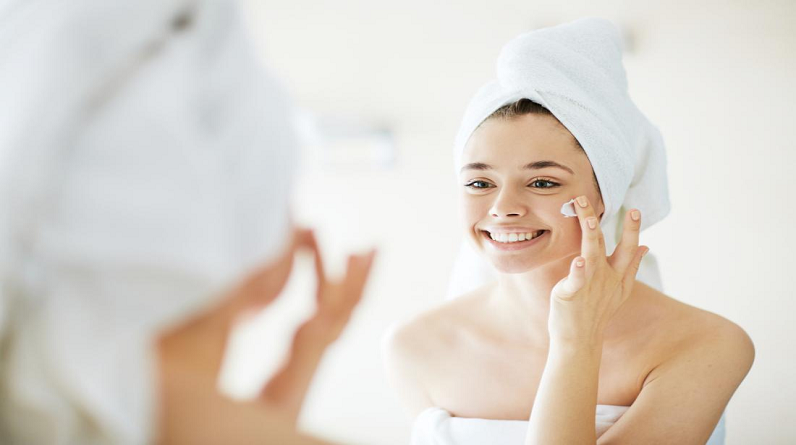We all desire to achieve our body goals, luminous complexion, but sometimes our skin falls short, leaving us feeling frustrated and self-conscious. Dry and unhealthy skin can not only affect our appearance but also have a significant impact on our overall well-being.
Statistics show that a staggering 50 million Americans suffer from dry skin conditions, with numbers steadily rising each year. The effects of dry skin go beyond mere aesthetics, as it can cause discomfort, itchiness, and even contribute to more severe skin issues. In fact, studies indicate that individuals with dry skin are more prone to developing conditions such as eczema, dermatitis, and premature aging.
Understanding the common causes of dry and unhealthy skin is crucial in taking the necessary steps to improve its condition. Factors such as environmental aggressors, harsh skincare products, inadequate hydration, and even certain medical conditions can all contribute to skin dryness. By addressing these underlying causes, we can pave the way to achieve the healthy, glowing skin we’ve always desired.
In this article, we will delve deeper into the common causes of dry and unhealthy skin, providing you with valuable insights and practical tips to restore your skin’s natural radiance. So, let’s dive in and discover the secrets to a healthier and happier complexion!
Tip 1: Hydrate from Within
Drinking an adequate amount of water daily is crucial for maintaining healthy and glowing skin. Water helps to hydrate the skin from within, improving its elasticity and overall appearance. In fact, studies have shown that even mild dehydration can lead to dryness and dullness in the skin. Aim to drink at least eight glasses of water each day to keep your skin well-hydrated and rejuvenated. Additionally, incorporating hydrating foods such as watermelon, cucumber, and citrus fruits into your diet can further boost your skin’s hydration levels.
Tip 2: Use a Gentle Cleanser
When it comes to cleansing your skin, opt for a mild cleanser that won’t strip away its natural oils. Harsh cleansers can disrupt the skin’s moisture barrier, leading to dryness and irritation. Instead, choose a gentle cleanser that effectively removes dirt, oil, and impurities without compromising the skin’s natural balance. Remember to use lukewarm water and avoid scrubbing your face vigorously to prevent unnecessary damage to your skin.
Tip 3: Moisturize Regularly
Moisturizing is essential for restoring and maintaining optimal skin hydration. Look for a moisturizer that suits your skin type and contains hydrating ingredients like hyaluronic acid or glycerin. Applying moisturizer after cleansing helps to lock in moisture, soothe dryness, and create a protective barrier against external aggressors. Make moisturizing a part of your daily skincare routine, both in the morning and before bed, to keep your skin soft, supple, and glowing.
Tip 4: Protect Your Skin from the Sun
Exposure to harmful UV rays can cause significant damage to the skin, leading to dryness, wrinkles, and even skin cancer. Protecting your skin from the sun is crucial for maintaining its health and vitality. Remember to apply a broad-spectrum sunscreen with SPF 30 or higher, even on cloudy days, and reapply it every two hours when spending time outdoors. Seek shade during peak sun hours, wear protective clothing, and don’t forget to shield your face with a wide-brimmed hat or sunglasses.
Tip 5: Follow a Balanced Diet
What you eat plays a vital role in the health of your skin. Include nutrient-rich foods in your diet to promote healthy and glowing skin. Opt for foods high in antioxidants, such as berries, leafy greens, and colorful fruits, as they help combat oxidative stress and support skin cell regeneration. Incorporate foods rich in healthy fats, like avocados and nuts, as they provide essential fatty acids that nourish the skin from within. Additionally, ensure you’re consuming enough vitamins and minerals through a well-balanced diet or consider supplementation if necessary.
Tip 6: Get Sufficient Sleep

According to health & fitness experts at thesis help UK, getting enough sleep is vital for maintaining healthy and radiant skin. During sleep, our bodies go through a restorative process, including skin cell regeneration and repair. Insufficient sleep can lead to a dull complexion, dark circles, and increased signs of aging. To improve sleep quality, establish a consistent sleep schedule, create a relaxing bedtime routine, and ensure your sleep environment is comfortable and conducive to rest.
Tip 7: Avoid Harsh Chemicals and Fragrances
Many skincare products contain harsh chemicals and fragrances that can irritate and damage the skin. These ingredients can disrupt the skin’s natural balance, leading to dryness, redness, and even allergic reactions. Opt for fragrance-free and gentle skincare products that are specifically formulated for sensitive skin. Read ingredient labels carefully and choose products with nourishing and natural ingredients that promote skin health.
Tip 8: Exfoliate Regularly
Regular exfoliation is essential for removing dead skin cells, unclogging pores, and promoting cell turnover. This process helps to reveal fresh, smooth, and glowing skin. Choose gentle exfoliants that suit your skin type, such as chemical exfoliants with alpha or beta hydroxy acids or physical exfoliants with fine particles. However, avoid excessive exfoliation as it can lead to skin irritation. Aim to exfoliate 1-2 times a week to maintain a healthy complexion.
Tip 9: Protect Your Skin from Harsh Weather
Extreme weather conditions can have detrimental effects on the skin. Cold and dry weather can cause moisture loss and skin dehydration, while hot and humid weather can lead to excess oil production and breakouts. To protect your skin, use appropriate skincare products for different climates, such as a hydrating moisturizer in winter and a lightweight, oil-free sunscreen in summer. Additionally, cover exposed skin, wear protective clothing, and use accessories like hats and sunglasses to shield against harsh weather elements.
Tip 10: Practice Stress Management
Stress has a significant impact on our overall well-being, including our skin health. High stress levels can trigger or worsen skin conditions like acne, eczema, and psoriasis. Incorporate stress management techniques into your routine, such as exercise, meditation, deep breathing exercises, and engaging in hobbies or activities you enjoy. Taking care of your mental and emotional well-being can help reduce stress levels and promote healthier, clearer skin.
Tip 11: Avoid Smoking and Limit Alcohol Consumption
Smoking and excessive alcohol consumption can have detrimental effects on the skin. Smoking restricts blood vessels, reducing blood flow and oxygen supply to the skin, resulting in a dull complexion and premature aging. Alcohol dehydrates the body, leading to dryness and inflammation in the skin. Quitting smoking and moderating alcohol intake can significantly improve your skin’s health and appearance. Seek support from healthcare professionals or support groups to help you in your journey.
Tip 12: Exercise Regularly

Regular exercise not only benefits your overall health but also has positive effects on your skin. Exercise improves blood circulation, delivering oxygen and nutrients to the skin cells, giving you a healthy, radiant glow. It also helps flush out toxins through sweat, promoting clearer skin. Incorporate physical activity into your routine, such as brisk walking, jogging, or yoga, for at least 30 minutes a day to reap the skin-enhancing benefits.
Tip 13: Limit Hot Showers and Baths
While hot showers and baths may feel relaxing, they can strip the skin of its natural oils, leading to dryness and irritation. Opt for lukewarm water instead, and limit your bathing time to avoid excessive moisture loss. After bathing, pat your skin dry gently and immediately apply a moisturizer to lock in hydration. This will help maintain a balanced moisture level and prevent dryness, allowing your skin to stay healthy and supple.
Tip 14: Protect Your Skin from Pollution
Environmental pollutants can wreak havoc on the skin, causing oxidative stress and premature aging. Protect your skin by minimizing exposure to pollution. Use a physical barrier like a wide-brimmed hat, scarves, or clothing to shield your skin from pollutants. Incorporate antioxidants into your skincare routine, as they help neutralize free radicals caused by pollution. Additionally, cleanse your skin thoroughly every evening to remove impurities accumulated throughout the day.
Tip 15: Avoid Touching Your Face Frequently

As concluded from the papers of literature review service, our hands come into contact with numerous bacteria and dirt throughout the day, and touching the face frequently can transfer these impurities, leading to breakouts and infections. Practice healthier habits by avoiding unnecessary touching of your face. Be conscious of touching your face, especially when your hands are not clean. Regularly wash your hands with soap and water, or use hand sanitizer when soap is not readily available, to maintain good hand hygiene and protect your skin from potential harm.
Tip 16: Use a Humidifier
Combat dry indoor air and maintain skin moisture by using a humidifier. Humidifiers add moisture to the air, preventing dryness and promoting a healthier environment for your skin. Place a humidifier in your bedroom or areas where you spend most of your time. Keep the humidity level around 40-50% for optimal comfort. Remember to clean and maintain the humidifier regularly to avoid the growth of bacteria or mold.
Tip 17: Wear Protective Clothing and Accessories
Shielding your skin from harsh elements is essential for maintaining its health and preventing damage. Wear protective clothing, such as long sleeves, hats, and sunglasses, to minimize exposure to the sun’s harmful UV rays. In cold weather, layer up with appropriate clothing to protect against dryness and windburn. Additionally, consider using umbrellas, scarves, or face masks to protect your skin from pollution or harsh winds.
Tip 18: Limit Sugar and Processed Foods
The foods we consume have a direct impact on our skin’s health. Limiting sugar and processed food intake can help improve skin conditions like acne and inflammation. These foods can cause spikes in blood sugar levels, leading to increased oil production and inflammation in the skin. Opt for whole foods rich in vitamins, minerals, and antioxidants, like fruits, vegetables, lean proteins, and whole grains, to support healthy skin from within.
Tip 19: Practice Proper Makeup Removal
Makeup removal is crucial for allowing your skin to breathe and preventing clogged pores and breakouts. Use gentle and effective methods to remove makeup, such as micellar water, oil-based cleansers, or makeup remover wipes. Be thorough but gentle, avoiding harsh rubbing or tugging on the skin. After removing makeup, follow up with a gentle cleanser to ensure all residues are cleared, and finish with moisturizer to keep your skin hydrated.
Tip 20: Consult a Dermatologist
If you’re experiencing persistent skin issues or seeking personalized advice, don’t hesitate to consult a dermatologist. Dermatologists are experts in diagnosing and treating various skin conditions. They can provide tailored recommendations and treatment options based on your specific needs. Whether you’re dealing with acne, eczema, or any other skin concern, a dermatologist can offer valuable insights and help you achieve optimal skin health. To check credibility of expert you can check on trustpilot reviews as well. Don’t hesitate to schedule a consultation for professional guidance on your skincare journey.
In Conclusion
Achieving and maintaining healthy, glowing skin requires a holistic approach to skincare. By addressing various factors that impact skin health, such as hydration, cleansing, moisturizing, protection, and lifestyle choices, you can enhance your skin’s vitality and radiance. Incorporating the tips mentioned above into your skincare routine can make a significant difference in the health and appearance of your skin.
Remember, it’s not just about using the right products or following a strict regimen. It’s about adopting healthy habits, both internally and externally, that support your skin’s well-being. Hydrate from within, choose gentle skincare products, moisturize regularly, protect your skin from environmental factors, practice stress management, and take care of your overall health.
So, whether you’re battling dryness, acne, or simply seeking that radiant glow, start implementing these tips into your daily routine. Embrace a holistic approach to skincare, and your skin will thank you with a renewed and vibrant complexion. Here’s to healthier, glowing skin and a confident, radiant you!


